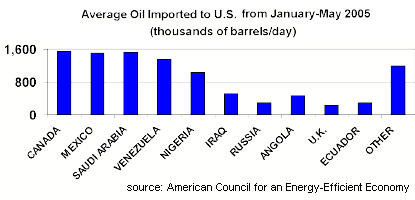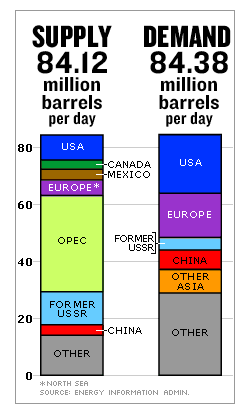

|
| weblog/wEssays archives | home | |
|
Where There Is Ruin (July 24, 2006)  One of my favorite lines from the poet Rumi is "Where there is ruin, there is hope of
treasures." Unfortunately, I fear we have not yet reached the state of ruin--though we may
be close.
One of my favorite lines from the poet Rumi is "Where there is ruin, there is hope of
treasures." Unfortunately, I fear we have not yet reached the state of ruin--though we may
be close.
Someone who seems to share the same perspective is Newt Gingrich, former Speaker of the House of Representatives. Politicos tend to have a love/hate view of Newt, understandably so given his rabid partisanship and phenomenal ability to hoist himself on his own petard. (Recall that Newt gave "compassionate conservatism" a newly ironic twist by serving his second wife divorce papers while she lay in a hospital bed.) But regardless of your previous opinions of Mr. Gingrich, read the following excerpt from The New Republic's Recent Profile of Newt Gingrich and see if if it doesn't strike you as insightful: "I believe that the scale of total challenge we face is more like April 1861 than any other period since then," Gingrich says. He goes on to explain that April 1861 was the month Fort Sumter was fired upon, setting off a chain of events--from the Civil War to the construction of the transcontinental railroad to the printing of paper currency--that no one at the time foresaw. "You go back through the cold war, the Second World War, the Great Depression, the First World War--each of those were large, singular, focusable events. In some cases, they were excruciating, but they were containable," he says. "We're going to be hit over the next 15 or 20 years with so many different things simultaneously that the total number of solutions we have to come up with is going to stretch our capacity as a society to talk to itself well enough to actually reach agreement to get something done."I think Newt's key insight is that we are poised on the edge of crises for which there are no predictable projections or outcomes. Consider this excerpt from another TNR piece on the Lessons of the 1967 War in the Mideast: Now, as the region teeters on the brink of a new and potentially more violent cataclysm, it is important to revisit the lessons of the Six Day War, a conflict that few Middle Eastern countries wanted and none foresaw.Is the present conflict between Hezbollah and Israel a similarly unstable situation fraught with the risk of spinning out of control? While that scenario is by no means inevitable, given the region's history, it does retain a certain plausibility. Armchair strategists willing to take an objective, even disinterested point of view of the conflict might well conclude that Hezbollah is in a win-win situation and Israel is in a lose-lose situation. If Israel continues the campaign to degrade Hezbollah's military, then Hezbollah can portray itself as the heroic resistance and Israel as the killer of civilians. If Israel stops the campaign, then Hezbollah declares victory.  Looking beyond southern Lebanon, armchair strategists may ponder what, from the Israeli
perspective, can be done to disrupt the flow of cash, supplies and weaponry from
Syria and Iran to their sworn enemies, Hezbollah. One choice is an all-out war against these
two nations, but the outcome would be unpredictable and Israeli losses might be heavy.
An alternative would be to simply disrupt or destroy the source of both Syria and
Iran's revenue: oil.
Looking beyond southern Lebanon, armchair strategists may ponder what, from the Israeli
perspective, can be done to disrupt the flow of cash, supplies and weaponry from
Syria and Iran to their sworn enemies, Hezbollah. One choice is an all-out war against these
two nations, but the outcome would be unpredictable and Israeli losses might be heavy.
An alternative would be to simply disrupt or destroy the source of both Syria and
Iran's revenue: oil.
Destroying the fragile network of pipelines, refineries, storage tanks and dock facilities which generate approximately 90% of the revenues of both Syria and Iran would offer several advantages: the effect would be immediate, the cost in aircraft low, and the risk of civilian casualties much lower than in a ground assault in Lebanon. Oil facilities are not hardened targets--on the contrary, they're explosions and fires just waiting to be set off. Who might protest such destruction, other than Syria and Iran? The West, of course, as the price of oil would quickly rise to unpredictable heights. But as the chart above reveals, not all of the West relies on Iranian and Syrian oil. The U.S., it seems, does not import oil from these nations. The clear winners in such a scenario would be those oil exporters whose capacity remained undamaged, which in the Mideast would be the Sunni nations who may well have some concerns about Shi'ite Iran's regional aspirations. There would be some irony in this scenario, as Iran has constantly held out the disruption of oil as their leverage over the West. What if their ability to supply oil was wrested from their grasp by a co-ordinated air attack? Their leverage would rapidly sink to near zero. Just how much oil would be lost to global supply if Iran and Syria's oil infrastructure was destroyed in a series of air strikes? According to Iran may threaten oil weapon, Arabs will not, perhaps 3% of current supply: Iran, OPEC's second biggest producer, supplies the world with more than 2.4 million barrels per day (bpd), making it the fourth biggest exporter. Traders say a loss of this amount would be hard to replace as, except for about 2 million bpd of spare crude oil capacity in top exporter Saudi Arabia, OPEC is pumping flat out. Syria exports only about 200,000 bpd of oil.Armchair strategists might expect Russia to protest, but not too much, as the skyrocketing price of oil would quickly boost its own revenues. The developed and developing nations would both suffer severe dislocations if the cost of oil rose above $100, but conservation and rapid investment in alternative sources of energy would eventually fill the gap created by the disruption of Iranian and Syrian oil exports. Once deprived of 90% of their revenues, Iran and Syria's export of aid to groups such as Hezbollah--not to mention the maintenance of the social welfare systems on which their leaderships depend for political support--would become increasingly difficult to fund. Would Iran and Syria strike back as Israel, starting a wider, lengthier open-ended war? Perhaps, but their ability to rebuild their revenue source would only suffer more damage in a wider, longer war. Given Israeli air superiority, would such a war offer any benefits to Iran and Syria? This is, of course, mere speculation on what armchair strategists might ponder. Who else might be speculating on such scenarios? Planners in various governments, perhaps? For more on this subject and a wide array of other topics, please visit my weblog. copyright © 2006 Charles Hugh Smith. All rights reserved in all media. I would be honored if you linked this wEssay to your site, or printed a copy for your own use. |
||
| weblog/wEssays | home |